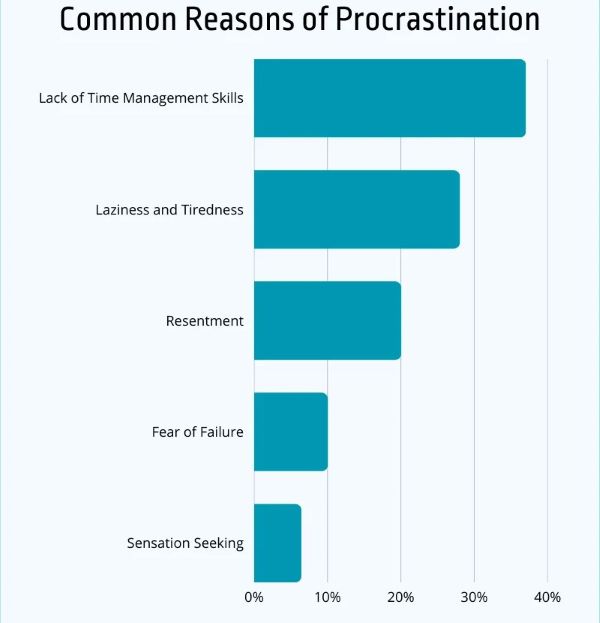The Opposite of Procrastination - Productive Procrastination
- October 14, 2024
Procrastination gets a bad rep. But…maybe it shouldn’t.
With workforces running lean with fewer employees, everyone wants productivity to be at the forefront of their minds. Sadly, studies show that 48% of employees self-report being productive less than 75% of the time. So, if an employee has a 40-hour work week, that means that only 10 of those hours are reported as productive.
So, what if we told you that there is a way for employees to procrastinate, and it is not a bad thing? In fact, it could actually mean happier employees. A recent survey found that 82% of employees said feeling happy and engaged at work is a key driver of their productivity, so this technique is something that employees should certainly consider embracing.
Enter productive procrastination.
Productive procrastination is when you delay an important task by doing another less urgent activity. It does not mean you aren’t doing anything and wasting your time.
It just means you are doing something else before the important task at hand.
Here, we’ll cover what you should know about productive procrastination. This should help you understand how you can use it to your benefit to really increase the quality and output of the work you produce.
What is productive procrastination?
As we discussed, productive procrastination is when you delay an important task and focus on a less urgent activity. It still means you are being productive, but maybe not with the most important task on our list. But- that is okay! This can help you feel a sense of accomplishment and reduce any guilt you might feel if you are procrastinating.
Statistics on procrastination: Source
What's the difference between productive and unproductive procrastination?
There’s a big difference between productive and unproductive procrastination.
For example, laying on the couch watching Netflix and scrolling on short-form video outlets on your phone is a lot less productive than taking a short walk and making notes for a future project, searching for the best email marketing service for a future project, or organizing your files so you can find important information later.
With both of these scenarios, yes, you are procrastinating for an important task, but productive procrastination sets you up for future success at work, while unproductive procrastination simply makes you waste time.
Source: Pexels
5 examples of productive procrastination at work
Productive procrastination can look different for different people, but here are some common examples of what that might look like in action:
#1 Focusing on an easy project
This may seem like low-hanging fruit to address, but tackling a small and easy project could boost your productivity for a bigger project.
#2 Tidying up your workspace
Tidying up your desk or organizing files can help optimize your workspace for productivity, allowing you to work on important tasks later.
#3 Learning a new actionable skill
Taking an online course or reading a helpful article, especially on learning the best productivity hacks, can boost your knowledge and skills.
#4 Professional networking
Engaging with colleagues, attending professional events, or reaching out to new contacts can build relationships that may benefit your career.
#5 Taking a walk during your break
Physical activity can boost your energy and focus, making you more effective when you return to your main tasks.
Source: Pexels
What are the benefits and drawbacks of productive procrastination?
The way we see it, there are always benefits and drawbacks to any decision we make, and productive procrastination is no exception. Especially because you are still getting things done, just maybe not in the order that you had originally wanted them to happen.
Productively procrastinating can help you improve your creativity and problem solving skills. Being able to step away from a big project and focus on something else, even if it’s just organizing files on your desktop or networking with a fellow employee, can give your brain the breathing room it needs. A recent case study discovered that motivating employees to take breaks improved productivity scores by 21%. Many times, just stepping away from your big project can enhance your overall creativity and problem-solving skills, which are so readily needed to get a big project done.
Productively procrastinating can help you prioritize what you need to do. Having a big to-do list is… overwhelming, to say the least. The never-ending hamster wheel and miles-long to-do list can sometimes seem unbearable to tackle. However, do you know the feeling of satisfaction you get when you cross something off your to-do list? That’s how productive procrastination can help you. It doesn’t mean that you aren’t tackling items on your to-do list. It just means you are prioritizing smaller projects instead of headfirst tackling the biggest one—and that’s okay. Productive procrastination is another method of prioritizing your tasks.
Busy Tag: Stay focused and avoid distractions
On the downside, if you aren’t prioritizing your time well, you could spend too much time on nonessential tasks. When you are practicing productive procrastination, just make sure that you always keep the big picture in mind and still tackle things that need to be completed within a certain time frame.
Unfortunately, getting nonessential tasks done may give you a false sense of productivity. Cleaning out that closet at work made you feel good, but that doesn’t mean you don’t need to go back and tackle your big project. Quite the contrary, productive procrastination like clearing out a closet should actually motivate you to then go back and work on your project,
A final drawback is that continuously being productive could lead to self neglect and increased stress. Getting things done and checking things off your to-do is great. However, there is such a thing as being too productive, which can increase your stress levels and cause you to neglect your health and well-being. Tapping into productive procrastination is always a good idea. Just ensure that you are also scheduling time to really take a mental and physical break from all things work-related.
Source: Pexels
How to procrastinate productively
As we’ve seen, productive procrastination can be a good thing when done right. It’s not something that you want to do all the time, but if you have to procrastinate, there is certainly a method to the madness.
1. You should identify why you procrastinate
One of the first things you should do is identify your personal motivations behind why you procrastinate. If you find yourself continuously procrastinating productively, you probably need to take a step back and analyze why this is happening too frequently. We get and support the idea that procrastination needs to happen every now and then. However, if it is something that you are always tapping into, you need to take a look at what your personal motivations are behind procrastinating.
Your reasons could be anything from a job that doesn’t spark passion, work that you find boring, or simply a season of extreme tasks and businesses. If it’s the latter, maybe that’s something that’s okay for you to power through. But, if you feel like you’re not in the right job, then you might want to ask yourself if that is what is making you put off until later.
Get Your 100+ Procrastination Quotes PDF Download
2. Plan your day effectively
One of the best ways to set yourself up for productivity success is to start your day by having everything planned out. Try to think ahead to any meetings you have going on that day, then set aside some time for you to get work and projects done. If things don’t go exactly as you had planned, don’t stress about it. If you have trouble working quickly, learn the best productivity improvement strategies so can excel in your position.
3. Set achievable goals
Whenever you take on a new project, set achievable goals and timelines to reach them. Do not overcommit. In fact, maybe consider under-committing and wow-ing your managers if you have time to go above and beyond what you promised. Just ensure that whatever you promise to do, you are able to do as planned.
4. Manage overwhelm
Having a lot to do can be a good thing, but sometimes, it can be overwhelming. If looking at your task list gives you stress instead of motivation, then take a moment to manage it to see how you can break down larger tasks so they aren’t as overwhelming. Some easy to adopt strategies you can start today are defining clear subtasks, prioritizing your work, setting milestones, and allocating time blocks to ensure you have time set aside.
Source: Pexels
The opposite of procrastination - proactivity
If procrastination can mean putting things off until the last minute, you might wonder what proactivity is. Proactivity is the deliberate and intentional approach to taking action before a situation demands it. Unlike procrastination, where tasks are delayed despite their importance, proactivity involves anticipating needs and challenges and addressing them in advance.
If you are a proactive employee, it means that you have foresight and planning into possible situations before they even happen. Not everyone is naturally proactive, but it is something that everyone can learn. To be proactive, you need to set clear goals and consistently follow through. This can help you stay ahead of potential issues and capitalize on opportunities as they present themselves.
Proactivity and procrastination are complete opposites. Procrastination is filled with delays and avoidance, which can mean last-minute rushes and increased stress levels. Proactivity, however, is about foresight and preparedness, reducing the likelihood of crises and allowing for a more measured, less stressful approach to tasks.
What are the benefits of proactivity?
There are a lot of benefits to being proactive, the main one being that you’ll see a big boost in your productivity. That, of course, can help you reduce stress since you’ll probably avoid problems that you already mitigated.
Some real-life examples of what proactivity might look like for you to is to always be learning and keeping your workplace nice and tidy. Another great proactive example is being sure to set aside time for regular exercise and some self care to ensure you’re watching out for your long-term health and well-being.
Final thoughts on productive procrastination
As you can see, procrastinating doesn’t always have to be bad. If you embrace the art of productively procrastinating, you can get a lot done from your to do list instead of spending hours scrolling through your phone. Networking, cleaning out your desk drawers, and working on smaller tasks are all effective ways to productively procrastinate before working on a big project. Embrace productive procrastination, and you will see how it will quickly benefit you in the workplace.
LUXAFOR HELPS PEOPLE TO ACHIEVE THEIR GREATEST PRODUCTIVITY LEVELS WITH A WIDE VARIETY OF OFFICE PRODUCTS. LET’S BE PRODUCTIVE TOGETHER!
Get Your 100+ Procrastination Quotes PDF Download
Get Your 100+ Procrastination Quotes PDF Download
Procrastination is the act of voluntarily delaying or postponing a task despite knowing there could be negative consequences for doing so. It's essentially the act of putting things off, often prioritizing less important tasks or engaging in leisure activities instead.
The power of procrastination refers to the idea that sometimes, delaying tasks can lead to better outcomes. This can be due to factors like increased creativity, reduced stress, or improved decision-making.
Not necessarily. While procrastination can be detrimental in many cases, there are situations where it can be beneficial.
For example, delaying a decision can allow for more information gathering and reflection.








